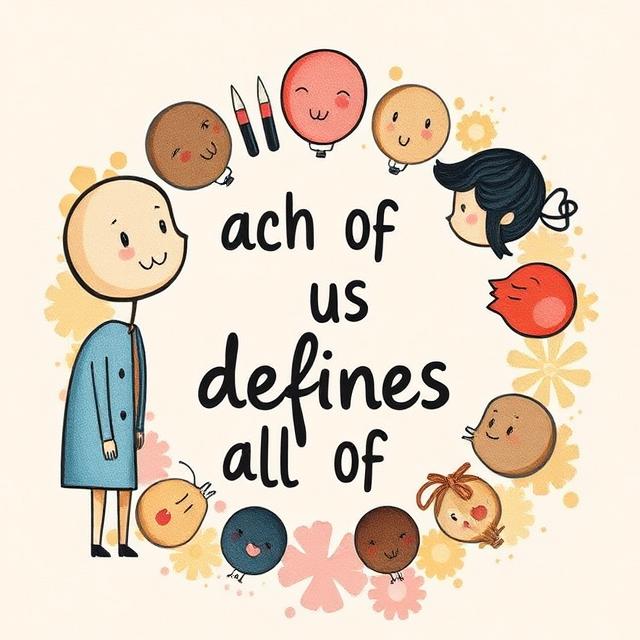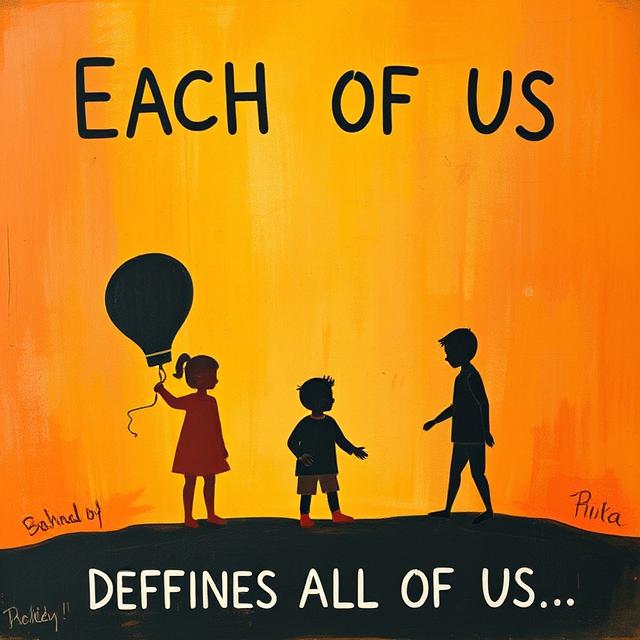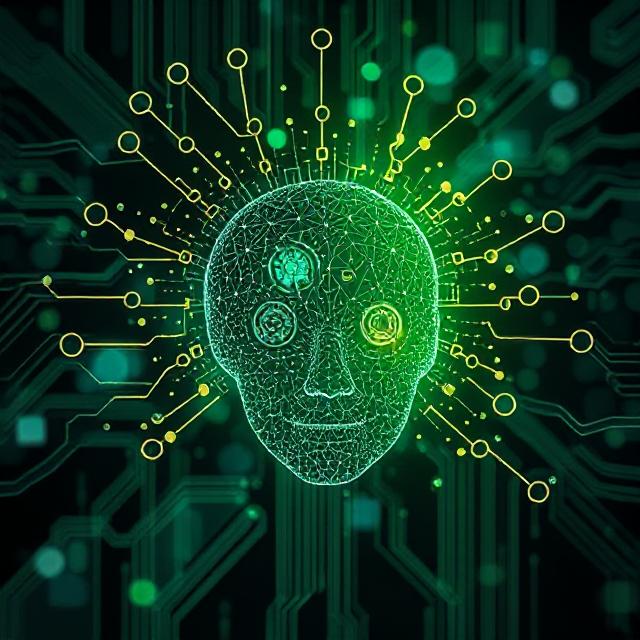Introduction
The phrase “Each of Us Defines All of Us” may appear simple at first glance, but it holds profound implications about the interconnected nature of humanity. In a globalized world where cultures, communities, and ideologies constantly interact, the actions of one individual can shape the perceptions, realities, and future of entire groups. This concept isn’t merely philosophical—it is a social truth. Every decision, behavior, and contribution of an individual adds a unique thread to the fabric of society. This essay explores the meaning, relevance, and impact of the idea that each of us plays a role in defining all of us. It examines how individual behavior influences collective identity, highlights historical and contemporary examples, and emphasizes the importance of responsibility, empathy, and unity in shaping a better world.
The Core Meaning: Interdependence in Human Identity
At its heart, the statement “Each of Us Defines All of Us” conveys a powerful message about interdependence. No one exists in isolation; we are all part of a broader collective—family, community, nation, or humanity as a whole. Our actions reflect not only on ourselves but on the groups we represent. When one person behaves ethically and compassionately, it sets a precedent, subtly influencing others to do the same. Conversely, harmful actions by an individual can tarnish the image of an entire group.
In essence, this phrase emphasizes the ripple effect of individual choices. Whether we are aware of it or not, the way we act, speak, and contribute becomes a representation of the groups we belong to—be it religious, ethnic, professional, or national communities.
The Social Mirror: How Society Judges Collectives Through Individuals
Societies often generalize based on individual behaviors, especially in the age of mass communication. This tendency is both psychological and social. People find it easier to make sense of the world through simplified models, often forming stereotypes based on individual incidents.
For instance:
- When a sportsperson from a country excels internationally, it boosts national pride and changes global perceptions about that nation.
- On the contrary, when a citizen is involved in a criminal act abroad, it may negatively affect how outsiders view the entire community or country.
This mirrors the idea that each person becomes a representative of a larger identity. Therefore, individual integrity and conduct have consequences beyond personal boundaries.
Historical Examples: Individuals Who Redefined Collective Identity
Throughout history, certain individuals have stood out not just for their personal achievements but for how they redefined collective identities:
- Mahatma Gandhi – Gandhi’s philosophy of non-violence and civil disobedience became synonymous with India’s freedom movement. His personal ethics came to represent a nation striving for dignity and justice, and his influence extended globally, defining peaceful resistance for generations.
- Martin Luther King Jr. – His leadership during the Civil Rights Movement transformed the narrative about African Americans in the United States. His courage, dignity, and eloquence redefined perceptions of black identity and human equality.
- Malala Yousafzai – As a young advocate for girls’ education in Pakistan, Malala has redefined how the world sees Muslim girls, from victims of oppression to empowered agents of change.
These individuals didn’t just change their lives—they redefined how their communities were seen and inspired new narratives of hope and courage.
The Digital Age: Amplifying the Definition
In today’s digital era, the statement “Each of Us Defines All of Us” carries even more weight. Social media platforms allow individuals to share their voices globally. This can be empowering but also dangerous. A tweet, a video, or a blog post can go viral, either inspiring millions or spreading harmful misinformation.
Because of this visibility, individuals often become ambassadors of their culture, religion, gender, or profession. In a multicultural world where first impressions are often digital, people may encounter a culture for the first time through the content shared by one person.
Therefore, responsible online behavior, thoughtful engagement, and cultural sensitivity are not optional—they are essential in preserving the dignity and image of collective identities.

Moral Responsibility: The Power of Representation
Understanding that we represent more than ourselves brings with it a profound sense of moral responsibility. We are not just consumers or contributors—we are builders of collective consciousness.
Consider a few areas where this moral responsibility becomes especially crucial:
- Professionals and Public Servants
Doctors, teachers, police officers, and politicians are judged not only as individuals but also as representatives of their professions. A single unethical act by one can damage the trust in the entire system. - Youth and Students
The younger generation often becomes the face of the future. Their behavior reflects the values of their families, schools, and societies. Investing in their character development is vital. - Citizens and National Identity
Whether abroad or at home, each citizen reflects their country. Respectful conduct, civic sense, and cultural pride contribute to a nation’s global image. - Religious Followers
People often associate followers of a religion with the religion itself. Thus, practicing compassion, tolerance, and empathy helps counter extremism and fosters interfaith harmony.
Empathy and Inclusion: Redefining “Us”
A significant implication of the phrase is that the concept of “us” is evolving. In an increasingly globalized world, “us” doesn’t end at the borders of our identity. When we say “Each of Us Defines All of Us,” it also means that humanity as a whole is shaped by every person.
This calls for empathy and inclusion:
- Empathy encourages us to understand how our behavior affects others.
- Inclusion ensures that all voices are part of the collective identity being formed.
When we include diverse perspectives in our collective story, we build a society that is richer, stronger, and more resilient.
Breaking Stereotypes: Individual Power Against Prejudice
One of the most transformative aspects of individual influence is the power to break stereotypes. Prejudices thrive on generalization, but real human experiences challenge these simplifications.
Examples:
- A woman in STEM challenges the stereotype that science is a male domain.
- A man openly discussing mental health normalizes emotional vulnerability in male identity.
- A transgender athlete representing their country redefines traditional concepts of gender.
When individuals boldly and authentically live their truth, they force society to confront and rethink outdated assumptions. In doing so, they expand the definition of what is “normal,” “acceptable,” or “expected.”
The Role of Education: Shaping the Individual for Collective Good
Education plays a crucial role in helping individuals understand their role in society. Beyond academics, it must foster values such as empathy, cooperation, and critical thinking.
When students are taught that:
- Their actions have consequences,
- Their voice matters, and
- Their character shapes their community,
…they grow up as responsible citizens who contribute positively to society. Education that prioritizes character alongside knowledge helps produce individuals who define “all of us” with honor and integrity.

Challenges in Practicing Collective Responsibility
While the idea of individual impact is powerful, it is not always easy to live by. Challenges include:
- Cultural Barriers: Not all societies are open to individual expression or change, especially when it challenges the status quo.
- Fear of Judgement: People often conform to avoid criticism, even if they disagree with prevailing norms.
- Systemic Injustice: In some cases, individuals trying to bring change face resistance from institutions or authorities.
Despite these hurdles, change is always possible. Courage, persistence, and community support can help individuals stand firm and gradually influence societal transformation.
Conclusion: Redefining the Collective Through Conscious Living
“Each of Us Defines All of Us” is more than a poetic statement—it is a powerful reminder that our identity is intertwined with the identities of others. We are each a reflection of our communities, and in turn, our actions reflect back upon them. By living with integrity, embracing empathy, and taking responsibility for our words and actions, we contribute to a collective identity that is just, inclusive, and honorable.
In a world often divided by race, religion, politics, and borders, this idea holds the promise of unity. If each of us chooses to represent humanity with kindness and respect, we redefine what it means to be part of the human story.
Let us, therefore, live consciously. Let us lead with example. Let us remember that our actions—big or small—can redefine not just ourselves but generations to come. Because in the end, each of us truly defines all of us.




